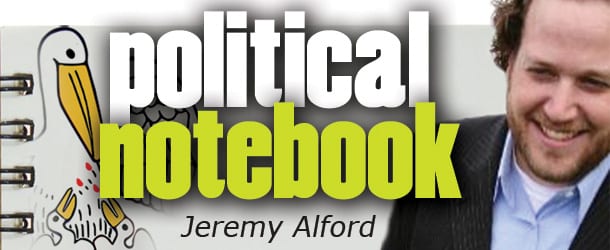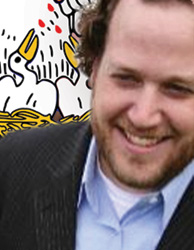By Jeremy Alford and Mitch Rabalais
The various candidates and political action committees involved in this fall’s election for governor are collectively sitting on $17 million that will more than likely be spent in the coming months on advertising, voter outreach and other campaign operations.
Based on the reports filed with the state Ethics Administration, the incumbent, Gov. John Bel Edwards, has nearly $8.4 million sitting in his campaign’s bank. But in modern politics, that’s the not the only number worth reviewing.
The super PAC that served as the flour in Edwards’ roux in 2015 is positioned to double its footprint during this year’s battle. Gumbo PAC director Trey Ourso said his outfit raised $1.4 million in 2018 and has $2.1 million in cash on hand, topping the $1.1 million it collected from the last gubernatorial cycle.
Gumbo PAC was also the recipient of $2.5 million from the Democratic Governors Association last go-around. With redistricting in the wings, and a lack of gubernatorial races to compete with in other states, political observers predict Gumbo could see a larger injection this year, and possibly much earlier than 2015’s runoff infusion.
“We are especially pleased with the broad spectrum of support that we’ve received,” said Ourso. “It just goes to show that people from all walks of life, and with varied interests, appreciate the job Gov. Edwards is doing to move Louisiana in the right direction.”
A super PAC is allowed to raise unlimited dollars, thanks to a U.S. Supreme Court decision. But it can only spend money to support or oppose candidates or issues; it cannot coordinate with campaigns on most activities, like spending.
The new campaign finance report from challenger Eddie Rispone, a Baton Rouge businessman and education advocate, showed that he had more than $5.5 million in the bank; of that, $5 million came from his own pockets.
Northeast Louisiana Congressman Ralph Abraham, meanwhile, revealed that he raised more than $350,000 in the final weeks of 2018. He has just as much sitting in his campaign kitty.
According to the Federal Elections Commission, Abraham has nearly $104,000 in his U.S. House campaign, which legally cannot be used directly on a state race. Existing case law, however, may permit Abraham to transfer those holdings to a supportive super PAC — and one has surfaced.
Securing Louisiana’s Future, a pro-Abraham super PAC that has not yet filed a state campaign finance report, began political activities in January. Consultant Brett Buerck, who is handling the PAC, said its fundraising has yielded “hundreds of thousands of dollars.”
SLF’s financial picture should become clearer come April 15, which is the filing deadline for PACs supporting major candidates in this fall’s elections.
Among the two other candidates expressing interest in the race is former Congressman John Fleming from Minden, who doesn’t have a state campaign account and is still carrying nearly $500,000 in debt following his 2016 U.S. Senate run.
Then there’s state Sen. Sharon Hewitt of Slidell, who’s “undecided” on a future office and has more than $250,000 in the bank. She is also said to be interested in making a bid for Senate president next year. That would mean running for re-election and winning this fall.
Business Group Takes New Approach To Elections
If you think you know the election operations of the Louisiana Assoc. of Business and Industry, think again.
Yes, the heart and soul of LABI’s election arm still resides with its four regional PACs, all of which achieved so-called “Big PAC Status” for the year. That means larger donations.
But now there’s also a front-end component that’s been incubating for the past 12 months — an emerging on-the-ground super PAC that will make independent expenditures and focus on judicial seats.
The Louisiana Free Enterprise Institute (LFEI) is among the most notable additions to LABI’s arsenal. It’s been hosting “boot camps” around the state to recruit conservative candidates; offer them a policy and political education; and streamline messaging for the 2019 legislative races.
“We’ve trained nearly 80 people, and we aim to at least triple that in the next two months,” said Marie Centanni, LABI’s director of public affairs and the head of the LFEI.
The association’s four regional PACs will still get the final say on which candidates are endorsed. They will have a large pool of contenders to vet.
“Our four PACs are going to have more choices,” said LABI president Stephen Waguespack. “We had to do something different, given what’s at stake in both chambers this cycle due to turnover and term limits … If you keep going to the same hunting grounds, you’ll keep getting the same kind of candidates. This is a different approach. We realized coming into this term that we couldn’t just sit on our hands.”
This will also be the first cycle in which LABI unleashes its “Free Enterprise Super PAC.” Unlike the regional PACs that provide candidates with direct donations, the super PAC will position LABI’s election arm to make independent expenditures in races that are already underway.
PAC director Bo Staples estimated the super PAC is holding $128,000 — a figure that’s expected to grow in quick order.
Waguespack said LABI is in the process of rolling out another new operation that will focus solely on judicial seats. A report card system to grade legislators, recruiting and continuing education are also going on.
While LABI has a long tradition of filing amicus briefs, the judicial program will allow the association to be more proactive than ever on that front, Waguespack said.
Political History: The Ed Steimel Story
In the long history of Louisiana politics, few figures have left as much of an impact as Edward Joseph Steimel Sr., the man who effectively made PAR a major player at the Capitol and created LABI. In an era when loud voices, huge personalities and big egos dominated inside the rails, Steimel’s quiet and bookish demeanor stood out.
Despite spending most of his career in the Bayou State, Steimel was born and raised in Arkansas. He graduated from Arkansas State University with a degree in journalism before taking a job with the Baton Rouge Chamber of Commerce in 1949.
Proving to be an effective communicator and fundraiser, Steimel joined the staff of PAR before becoming the executive director in 1954. “I knew almost nothing about government when I went to the Public Affairs Research Council,” Steimel would tell audiences.
He was a quick study and proved to be one of the most effective leaders at the Capitol. According to The Politics of Reform by John Maginnis, Steimel’s crowning achievement came in the fall of 1971, when PAR redrew all 144 legislative districts only weeks before voters went to the polls. “The lights blazed late in the PAR offices at 300 Louisiana Avenue in Baton Rouge,” Maginnis wrote.
After guiding PAR through the 1973 Constitutional Convention, Steimel departed to help form a new group, the Louisiana Assoc. of Business and Industry. The following year, LABI won a huge legislative victory with the passage of the landmark Right-to-Work law. According to LSU political scientist Wayne Parent in Unmasking the Carnival, it was during the late 1970s and ‘80s that Steimel and LABI became a dominant force in the Legislature.
Steimel retired from LABI and politics in 1989 and spent the rest of his career as a fundraiser for LSU. He died in 2016.
Introducing Steimel for LPB’s Louisiana Legends, Gus Weill remarked, “He was probably and often the lone voice for decency and good government in Louisiana for decades.”
For more Louisiana political news, visit LaPolitics.com or follow Alford and Rabalais on Twitter via @LaPoliticsNow.














Comments are closed.